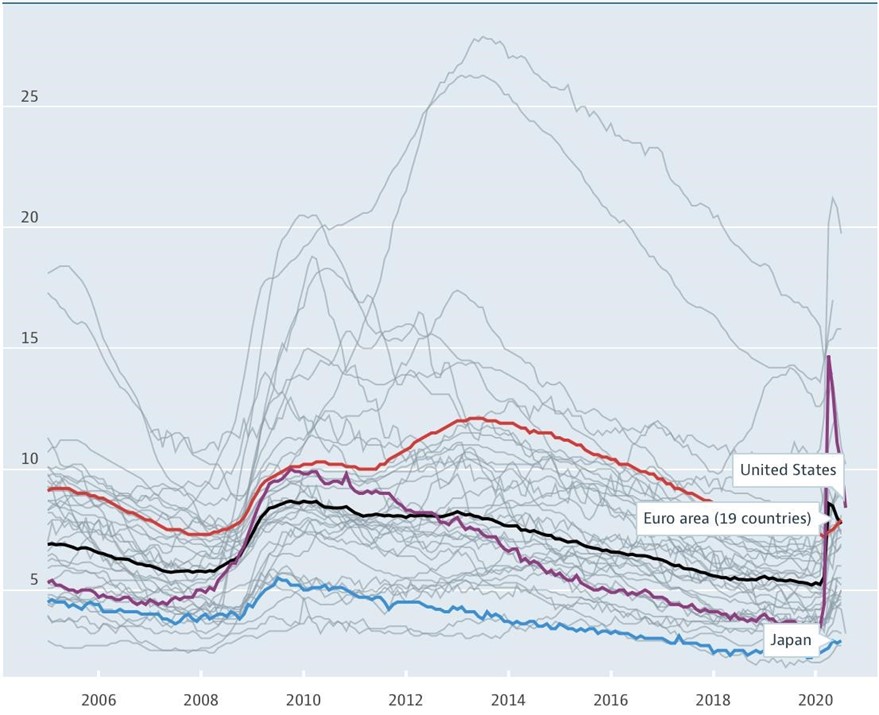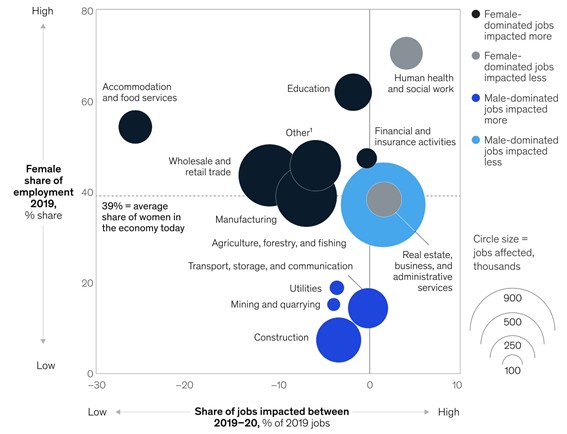Introduction
During the last century, Corporate Social Responsibility (CSR) has been inevitably crucial for businesses that strategically perform on the market, through boosting their image, branding and sales, attracting new investors and empowering the workforce’s productivity. Indeed, the basic concept behind the CSR underpins a responsible economic behaviour conducted by corporates to be in line with the society’s expectations. Here’s a clip explaining in detail what CSR is:
However, the pandemic drastically affecting the whole economy has put a strain on businesses from every side, especially when it comes to their social responsibilities.
Thus, “Which are the main factors that have affected the social responsibility of many corporates?”
The beforementioned research question have reasons to be answered if there is the belief that the current situation could have unprecedented consequences on CSR as a result of the most significant environmental changes in modern history.
Unemployment Risk and “Gender Gap”
Businesses from all over the world were forced to close because of the pandemic outbreak, causing a consistent disruption of trade in several industry sectors, especially in tourism, entertainment and hospitality. On top of that, many people have lost their jobs, and the situation seems to be out of control from governments that are trying to adopt different economic policies to avoid a considerable increase of unemployment rate. However, most virtuous countries have supported businesses through multiple fiscal stimuli, but others with less financial strengths could not operate in the same way.
Creon Butler (2020) claims that the lack of financial resources to invest in CSR and the necessity to be focused on the core operating business to survive in the short run have let companies to behave unethically when competing on the market, such as increasing prices or firing workers. On the other hand, sacrificing profits to prioritise people is considerably problematic for enterprises, particularly under the pressure of shareholders, suppliers and banks. The following video explains the unemployment situation in the US labour market after the outbreak:
As shown from the graph below (Figure 1), the unemployment rate worldwide has consistently increased during 2020, and it is double than the rate recorded after the financial crisis in 2008.
Total Unemployment Rate, % of Labour Force, Jan 2005 – Aug 2020

(Figure 1) Source: OECD, 2020
On the other hand, while some businesses are struggling, others are flourishing. There are different excellent examples to highlight:
- Manufacturing companies such as LVMH, Dayson and Zara have shifted their business models in order to recover the losses, producing masks, hand sanitiser, ventilators and other medical equipment by finding an opportunity to boost their image increasing their social responsibility (Gabriela Gutierrez-Huerter, 2020).
- Many leaders such as Bill Gates and Jack Ma, have strategically decided to be participative in helping to fight Covid-19 through donating money to researches.
- Almost all companies have allowed their employees to work from home, assisting them in changing their habits and working dynamics and investing in the necessary equipment (BBC, 2020).
Here is a short video where Micheal Rogerson from the University of Bath explaining how different companies are responding to the virus:
Furthermore, the social and economic consequences derived from the pandemic will considerably reshape CSR and strain the social justice systems.
Undoubtedly, some subjects have been more affected by the recent crisis and qualified as more vulnerable than in the past. This is the case of the vulnerability of women with children that has been particularly evident during the Covid-19 emergency and have emphasised the issue of the “gender gap”.
According to McKinsey (2020), women’s jobs are 1.8 times more vulnerable to this crisis than men’s jobs. This phenomenon is mainly due to two reasons:
- This is the effect of the closure of schools, kindergartens and all services aimed at families.
- This crisis has affected sectors, such as the education and care of children, where women are mainly employed.
The following video further explores this issue:
The aforementioned reasons can also be explained through the visual representation (Figure 2) of the Word employment impact by industry during 2020, in which women are distributed in a disproportional way within sectors that are expected to decline during this year.
Word employment impact by industry during 2020

(Figure 2) Source: McKinsey Global Institute Analysis, 2020
In light of this, J7 Enterprises will represent an excellent opportunity for firms to enlarge their relationships with consumers and improve their image on the market. They will guide businesses on how to be involved in socially responsible activities that will increase consumers’ expectation and their loyalty to brands. Lastly, they will help enterprises to create a sustainable development in which company and social values will be combined based on the protection of the environment, workers’ rights and social justice.
Consumers’ Ethical Behaviour and Preferences Distortion
The restrictive measures adopted during Covid-19 have consistently affected the consumers’ decisional processes. Bryan Lufkin & Varun Alagh (2020) suggest that during a period of economic instability, consumers are:
- More oriented towards rational decisions.
- Driven by emotions like anxiety, anger and fear.
- More conservative and cost-conscious.
- The expectation of deep recessions in the long period tend to reduce their consumptions and increase their saving capital needs.
Therefore, the impact on society of the new consumers’ consumption pattern is disruptive in the decisional process. Indeed, as stated by Sharma et al., (1994) Harmeling, Magnusson, & Singh (2015) and Ma et al., (2020), the nationalism sentiment and negative feelings derived from the self-isolation could let consumers to prefer domestic products and services. In this regard, Walsh & Bartikowski(2013) assert that people’s loyalty to the brand is positively affected by “corporate citizen behaviours”. However, this unpredictable event could shift the social responsibility of many businesses towards new values to be more adaptable to contemporary preferences. This situation inevitably will bring to design a new segmentation in the market that corporates need to be conscious of if they want to pursue a competitive advantage. Additionally, according to Mary O’Connor (2020), consumers are more health and wellness-conscious, and this will inevitably impact their preferences and ethical decisions on a global scale.
On this note, J7 Enterprises will provide outstanding marketing opportunities mainly focused on analysing the specific factors that are shifting consumers’ evaluations of values and satisfaction and giving remarkable insights on which strategies could be adopted in conformity to the new market metrics. The process will help businesses to create outcomes valuable differentiated on the market and better brand perception; the results will be the willingness of consumers to pay a premium rate (McWilliams et al., 2006). The team, through its strategic flexibility, will help organisations re-think about their visions, missions and objectives to be on track with the recent changes in demand and competition, and aim to sustainable growth in the long run.
“Which actions businesses can take to continue operating on the market strategically?”
To promote sustainable and lasting growth, during an emergency period, companies should be:
- Consistent: focused on planning actions closely linked to the best areas in which they are most competitive.
- Effective: recognize relevant issues and take practical measures that consistently reduce risks, mainly for their employees that represent the engine of the whole business machine.
- Adaptable: opened towards radical changes through a “cultural flexibility approach”. A flexibility approach doesn’t mean rejecting pre-existing values but adapts actions to be in line with the new market’s requests. Being able to shift the business model using tangible and intangible internal resources will not only provide a consistent response during critical circumstances but will also allow overcoming the hypocritical corporate social responsibility that only generates negative results.
- Communicative: the enrichment of the businesses’ missions consistently relies on the ability to communicate directly and transparently the sense of belonging of corporates to the community; thus, general marketing actions will mainly provide only ineffective results.
- Collaborative: understand the needs of all the most vulnerable groups among their workers, optimising and encouraging smart-working but also starting consumer loan systems and assisting governments in supporting expansionary policies aimed at employment.
Conclusion
The Covid-19 pandemic has inevitably stood as a massive problem for all industrial sectors. However, it still constituted as an opportunity for many other companies to defend their position and overcome the competition. Therefore, investing in a strategic plan focused on CSR could become an invaluable decision to take in order to survive in unpredictable circumstances like the one currently ongoing. Kervyn, Fiske & Malone (2012) suggest that there is a strong relationship between brand perceptions and CSR, and the engagement in socially responsible activities also improve businesses’ equity and performance (Lai et al.2010).
It is fundamental for businesses understand how to interpret and manage the measures aimed at moderating the short and long-term effects that this crisis will have on the economic and social systems whilst assuming obligations or specific guidelines to deal with the situation in the light of their social and environmental sustainability.
If, therefore, there is a lesson to be learned is that markets are in continuous evolution and businesses increasingly need to be supported by dynamic, adaptable and rapid solutions that J7 can provide through substantial experience and reliable advice.
References & Bibliography
BBC. (2020). Alibaba’s Ma donates coronavirus test kits to US. Available at https://www.bbc.co.uk/news/business-51904379 [Accessed 25 September 2020]
BBC. (2020). Coronavirus: Twitter boss pledges $1bn for relief effort. Available at https://www.bbc.co.uk/news/technology-52209690 [Accessed 25 September 2020]
Bryan Lufkin. (2020). Amid the coronavirus outbreak, people are flocking to supermarkets world-wide- but they are simply preparing, or irrationally panicking?. Available at https://www.bbc.com/worklife/article/20200304-coronavirus-covid-19-update-why-peopleare-stockpiling [Accessed 25 September 2020]
Creon Butler. (2020). How to survive the pandemic. Available at https://www.chathamhouse.org/publications/twt/how-survive-pandemic [Accessed 25 September 2020]
Cristina Criddle. (2020). Coronavirus: Dyson develops ventilators for NHS. Available at https://www.bbc.co.uk/news/technology-52021757 [Accessed 25 September 2020]
Gabriela Gutierrez-Huerter. (2020). COVID-19 poses new challenges for corporate social responsibility efforts. Available at https://www.kcl.ac.uk/news/covid-19-poses-newchallenges-corporate-social-responsibility-efforts [Accessed 25 September 2020]
Harmeling et al. (2015). Beyond anger: A deeper look at consumer animosity. Available at https://econpapers.repec.org/article/paljintbs/v_3a46_3ay_3a2015_3ai_3a6_3ap_3a676693.htm [Accessed 25 September 2020]
Kervyn, Fiske & Malone. (2012). Brands as intentional agents framework: How perceived intentions and ability can map brand perception. Available at https://www.sciencedirect.com/science/article/abs/pii/S1057740812000265 [Accessed 27 September 2020]
Lai et al. (2010). Circular economy practices among Chinese manufacturers varying in environmental-oriented supply chain cooperation and the performance implication. Available at https://www.sciencedirect.com/science/article/pii/S0301479710000411 [Accessed 27 September 2020]
Mary O’Connor (2020). Coronavirus: Stay fit to fight the virus, say medics. Available at https://www.bbc.co.uk/news/uk-52076856 [Accessed 27 September 2020]
Ma et al. (2020). The moderating role of personal cultural values on consumer ethnocentrism in developing countries: The case of Brazil and Russia. Available at https://www.sciencedirect.com/science/article/abs/pii/S0148296319307970 [Accessed 25 September 2020]
McKinsey. (2020). COVID-19 and gender equality: Countering the regressive effects. Available at https://www.mckinsey.com/featured-insights/future-of-work/covid-19-andgender-equality-countering-the-regressive-effects# [Accessed 27 September 2020]
McWilliams et al. (2006). Creation and capturing value: Strategic corporate social responsibility, resource-based theory and competitive advantage. Available at https://journals.sagepub.com/doi/abs/10.1177/0149206310385696 [Accessed 27 September 2020]
OECD. (2020). Unemployment Rate. Total, % of labor force, Jan 2005- August 2020. Available at https://data.oecd.org/unemp/unemployment-rate.htm [Accessed 25 September 2020]
Reuters Staff. (2020). Zara owner offers to make scrubs for Spain’s coronavirus-stretched hospitals Available at https://www.reuters.com/article/us-health-coronavirus-inditexscrubs/zara-owner-offers-to-make-scrubs-for-spains-coronavirus-stretched-hospitalsidUSKBN2153EK [Accessed 25 September 2020]
Sharma et al. (1994). Consumer ethnocentrism: A test of antecedents and moderators. Available at https://link.springer.com/article/10.1007/BF02894609 [Accessed 25 September 2020]
Varun Alagh. (2020). How Pandemic Is Reshaping Consumer Behaviour Post-Covid-19?. Available at https://inc42.com/resources/how-pandemic-is-reshaping-consumer-behaviourpost-covid-19/ [Accessed 25 September 2020]
Walsh & Bartikowski. (2013). Exploring corporate ability and social responsibility associations as antecedents of consumers satisfaction cross-culturally. Available at https://www.sciencedirect.com/science/article/pii/S0148296311004292 [Accessed 27 September 2020]

